 Earlier today Time Magazine announced its person of the year. And, surprise surprise… it went to Mark Eliot Zuckerberg, Facebook’s gold boy. Why? “For connecting more than half a billion people and mapping the social relations among them; for creating a new system of exchanging information; and for changing how we all live our lives”. Wow, these are big words.
Earlier today Time Magazine announced its person of the year. And, surprise surprise… it went to Mark Eliot Zuckerberg, Facebook’s gold boy. Why? “For connecting more than half a billion people and mapping the social relations among them; for creating a new system of exchanging information; and for changing how we all live our lives”. Wow, these are big words.
To put things into perspective, other persons of the year coming from the IT industry have included Amazon’s founder Jeff Bezos, Intel’s Andy Grove and Microsof’s co-founder Bill Gates. More in general, Zuckerberg joins big names, including a large range presidents of countries from all over the globe, a smaller number of dictators and two Popes. But let’s stick to the IT related events.
In 1982 Time named “The Computer” as the person of the year, anticipating that we were at the beginning of a new age: the personal computing era, which effectively took off in 1984. In 2006 Time’s picked another interesting choice for the person of the year: “You”. The reasoning was simple, and powerful: We are part of the Web, we make it happen, without us nothing goes. In a sense, it again anticipated a revolution: the beginning of Web 2.0.
Now, just four years later, Zuckerberg has been named person of the year for exactly the opposite: for creating a new (and closed) system of exchanging information. Just some weeks ago the Financial Times carried an extremely interesting article about the founder of the Web, Sir Tim Barner Lee’s complaint about Facebook closing up the Web and hence implementing his vision of a web of linked data in quite a different way than he anticipated.
In a sense, we have passed from a world in which WE were the main creators of the new Web, in which each of us has been a very valuable piece in the construction of a truly worldwide web, to a Web in which one company controls a growing portion of our Online activity. We all put our data, sure, but we don’t own nor control them any longer. If you have doubts that this is true, just try to delete your FB account. You will be surprised how tricky this is. Or, try to move to a different network without having to build all your social network from scratch. Hey, that’s hard to even imagine, isn’t it? Why, because we cannot take our data with us. That simple. FB has received this type of criticism in a number of occasions, and recently it has actually started to react. Some weeks ago, it introduced the possibility to download our data. That’s nice, but in the end, pretty useless. I don’t want to download my data, and receive a zip file. I want to be able to take my data with me, in geek terms, I want my data portability. And, as Elias Bizannes writes in his blogpost, data accessibility does not equal data portability.
So, what does all of this mean? History may again repeat itself. In 1982 Time anticipated a revolution, naming the computer person of the year. Some years later and for more than two decades, the IT industry was dominated by a single player that comfortably controlled or at least significantly influenced the entire ecosystem. In 2006, we seemed to have a good chance to get the control back, Web 2.0 and the cloud seemed to be coming. But in 2010, at least according to the Time magazine, we’re back to a single face. Let’s hope that the future proves them wrong.


Whatever one thinks of FB or Zuckerberg, the fact that he has already, at 26, pledged to give away most of his fortune is a great example. There are plenty of billionaires out there not only keeping it all for themselves, but trying to take even more from those who have little or nothing.
I understand and feel the frustration that Julian Assange was not chosen in the end, the diffculty of making that choice should also be evident to anyone with the slightest amount of common sense. I personally believe the charges from Sweden against Assange are politically motivated and either exaggerated or outright false, but I also have no patent proof of such. Were I the editor in chief of Time I would make the same decision, even though it might personally disappoint me to do so. The fact that Time considered Assange shows clearly their support of him in general.
Josefina Argüello – email template
I see Time has chosen their special person of the year again. I don’t have any serious heartburn over Zuckerberg being chosen. At least they didn’t go for that Wikileaks weasel Julian Assange or someone like Kim Jong-il … I’m surprised.